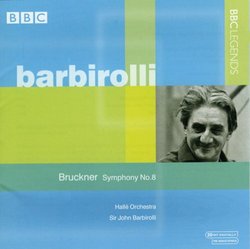| All Artists: Anton Bruckner, John Barbirolli, Hallé Title: Bruckner: Symphony No. 8; Barbirolli, Halle Orchestra Members Wishing: 1 Total Copies: 0 Label: BBC Legends Original Release Date: 1/1/1970 Re-Release Date: 8/14/2001 Album Type: Original recording remastered Genre: Classical Styles: Historical Periods, Modern, 20th, & 21st Century, Symphonies Number of Discs: 1 SwapaCD Credits: 1 UPC: 684911406726 |
Search - Anton Bruckner, John Barbirolli, Hallé :: Bruckner: Symphony No. 8; Barbirolli, Halle Orchestra
 | Anton Bruckner, John Barbirolli, Hallé Bruckner: Symphony No. 8; Barbirolli, Halle Orchestra Genre: Classical
This recording of Bruckner's Eighth Symphony is from Sir John Barbirolli's last London concert, some 10 weeks before his death, when the conductor knew heart problems might overtake him at any time. What better way to say ... more » |
Larger Image |
CD DetailsSynopsis
Amazon.com This recording of Bruckner's Eighth Symphony is from Sir John Barbirolli's last London concert, some 10 weeks before his death, when the conductor knew heart problems might overtake him at any time. What better way to say goodbye than with one of the greatest symphonies ever written? And this craggy, towering masterpiece is given as urgent a performance as you'll ever hear (complemented by vivid recorded sound). Pushing the tempi risks a grating superficiality, but Barbirolli more than gets away with it through sheer conviction (complete with podium stamping and trademark sing-alongs). The terrifying Scherzo, in particular, goes along at a lick, but what shivers are sent up the spine! The vast Adagio contains some messiness in the ensemble's playing, but give me this passion over "perfection" anytime. However, as Barbirolli's friend Michael Kennedy says in his sleeve note, the aging, ailing maestro didn't lose his sense of architecture and feeling for a phrase as the emotion flowed--the outer movements are characterized by awesome control as Barbirolli plots his course up the massive musical rock faces. Sickly swansong? No way! Favorite performances such as those by Haitink and Wand will feel a tad tame after this. --Andrew Green Similar CDs
|
CD ReviewsOverwhelming recension of the "greatest" symphony billmacv | Upstate New York | 11/05/2001 (5 out of 5 stars) "It was with some reservations that I came to Barbirolli's 1970 live performance of Bruckner's Eighth Symphony, despite the excellent press it received in England (the British tend to be myopically chauvinistic when it comes to their own composers, conductors and performers, and all but canonize Barbirolli). At first the reservations seemed to hold. The sound, though remastered, remains on the harsh side, with a brash glare on the fortissimi (of which there are plenty). Any quiet passage (of which there are no lack, either) offered opportunity for much throat-clearing and hawking from the audience. The performance is on the rough-hewn side, with none of the gleaming polish one has come to expect from state-of-the-art studio recordings, with every note in place and in balance. None of this matters once Barbirolli's vision of the symphony begins to unfurl. It's a fiercely committed, impassioned performance -- Bruckner's vast Gothic spaces lit by Italianate fire. Not only is this the most emotionally gripping performance of the 8th I've heard, it's one of the most overwhelming performances of anything I've ever come across. There is a vocal minority which considers (pace Beethoven) Bruckner's last completed symphony to be the pinnacle of symphonic literature; Barbirolli's is the performance to help convince skeptics." The spiritual, humane Brucknerian! David A. Hollingsworth | Washington, DC USA | 11/27/2001 (5 out of 5 stars) "A foretaste to the highly acclaimed Boulez 1996 recording with the Vienna Philharmonic Orchestra (VPO) under Deutsche Grammophon (DG)? Perhaps. Like Boulez, Horenstein, and even Jochum (though using the Novak edition), Barbirolli approaches the score with zest and a sense of urgency: a kind of dramatic exhuberence that would compel you to rise up in a hurry and say Halleluja. But are their performances emotionally and spiritually detached from this glorious score? Absolutely not. As with Horenstein, Jochum and Boulez, Barbirolli brings out the humanity of the score and of Bruckner. Since when should we look at his symphonies exclusively as musical cathedrals with its majestic structures? Indeed, the magic of Bohm, Barenboim, Wand, Karajan, Haitink, and Guilini rested in their ability in sustaining the monumental grandeur behind the symphonies. But, Barbirolli along with Jochum and Boulez give us other dimensions of Bruckner that shall equally be cherished. Horenstein approach is a wonderful synthesis of the majestic and the drama. To some extent, so is Barbirolli's.Michael Kennedy states in his sleeve notes that "For some conductors, the architectural splendor of Bruckner is their first consideration. For Barbirolli, it was humanity and spirituality." I agree to an extent, for the architectural splendor of Bruckner is inevitably a spiritual exercise deep in one's soul and subconscious: Wand, Barenboim (with the Chicago Symphony) and Karajan (with the VPO) are proven cases in point. But, Kennedy is absolutely right on Barbirolli. In the first and second movements, Barbirolli approaches them with fiery temperament and drive. His tempi are relentless and energetic, his impulsiveness obvious but never quite austere. His warmth is without question, though. The trio in the scherzo movement is nicely sustained and going to the Adagio, third movement, that sense of warmth is even more apparent. But, believe it or not, there is something of the architectural splendor in Barbirolli's approach. The dramatic edge of the first two movements and the finale are largely absent here. However, the passion accompanies the warmth admirably going into and beyond the glorious climax remarkably well-rendered here. The finale is exhuberently and idiomatically performed; it's well paced and dramatic and the ending lacks that Wagnerian grandeur that you'll see in Karajan's recording with the Vienna Philharmonic The performance of Barbirolli's Halle Orchestra is not entirely without flaws. The strings were not gifted with the sonority and the richness of the Vienna Philharmonic or the Concertgebouw. The brass is not particularly well-polished: a few crack notes prop up from time to time. But, the performance has fluency and commitment, especially given the fact that it was to be Barbirolli's last. The performance is not perfect. However, the insight behind it is special and Barbirolli gave us pure Bruckner without the Mahlerianism. A hyme of praise no question now or ever, no matter who you're asking." An eloquent tribute to Barbirolli's artistry -- one of his b Santa Fe Listener | Santa Fe, NM USA | 04/12/2008 (5 out of 5 stars) "This recording has attracted eloquent and perceptive reviews (I wish Amazon would give us more from Andrew Green, who seems more sensible and astute than their usual run). The basic facts have been well laid out already: Barbirolli is urgent, adopts speeds fast enough to seem risky, emphasizes the shaping of phrases rather than grand "architecture" (I'm not sure anymore what this overused term actually means, even when I use it!), and defies his mortality with increased energy in this, his final concert before he died.
As to the recorded sound, I don't hear the glare and harshness that another reviewer complains about, just a degree of thinnness. In the general run of broadcasts unearthed by BBC Legends, I'd say that this one belongs in the top quarter. The Halle Orchestra is placed close to the mike, which exposes their lack of technical finesse, but we get few jarring bobbles. Just be aware that the edgy lower strings would nevre be mistaken for the Vienna Phil., or the sometimes catch-as-catch-can brass climaxes. (How many great musicians were willing to live and play in Manchester on a miserably low salary in 1970? We have to be realistic.) For all that, the orchestra must have sensed something, because they play with heartfelt commitment and on the whole surpass themselves. In all, I can add my voice to the other reviewers who were totally caught up in Barbirolli's eloquence. This is a fitting tribute to him, and perhaps one he consciously carved out, given his precarious medical condition." |

 Track Listings (4) - Disc #1
Track Listings (4) - Disc #1



